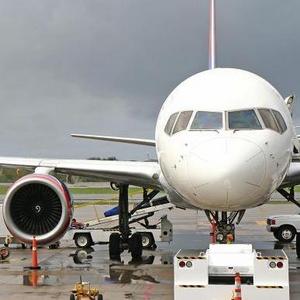Boeing, Embraer to open joint biojet research center in Brazil

May 13, 2014
BY Ron Kotrba
Two leading aerospace companies, Boeing and Embraer S.A., have signed a memorandum of understanding (MOU) to open a joint research center to advance a sustainable aviation biofuel industry in Brazil.
Under the MOU, the two companies will perform joint biofuel research, in addition to funding and coordinating research with Brazilian universities and other institutions. The research will focus on technologies that address gaps in a supply chain for sustainable biojet fuel in Brazil, such as feedstock production and processing technologies. The new research center is to be located in São José dos Campos Technology Park.
“Boeing is working aggressively around the world to expand the supply of sustainable aviation biofuel and reduce aviation’s carbon emissions,” said Julie Felgar, managing director of environmental strategy and integration, Boeing Commercial Airplanes. “With our joint biofuel research center, Boeing and Embraer are making a strong commitment toward a successful, sustainable aviation biofuel industry in Brazil.”
Advertisement
“Embraer is committed in supporting the development of sustainable biofuels for aviation and the joint efforts with Boeing will undoubtedly contribute to the company continuing to be in the forefront of research in this area,” says Mauro Kern, executive vice president, engineering and technology, Embraer. “Brazil has tradition in the area of alternative fuels and enormous potential yet to be explored in bioenergy research.”
“Boeing and Embraer have a tremendous opportunity to work together to enhance Brazil’s aviation biofuel capabilities, as well as the global industry’s access to aviation biofuel,” said Al Bryant, vice president, Boeing research & technology-Brazil.
In 2013, Boeing, Embraer and the Fundação de Amparo à Pesquisa of the State
Advertisement
of São Paulo (FAPESP) completed an action plan—Flightpath to Aviation Biofuels in
Brazil—that identified gaps in a potential biofuel supply chain. The joint research between Boeing and Embraer will help address those gaps.
More than 1,500 passenger flights using biojet fuel have been conducted around the world since it was approved for use in 2011.
Related Stories
As the demand for fleet decarbonization continues to intensify, Optimus Technologies on April 22 announced the production launch of its latest Vector System, a fuel system technology that enables heavy-duty engines to operate on B100.
Mammoet on April 23 announced that it will be implementing HVO fuel across the Netherlands, U.K. and Canada. The investment in HVO was driven by higher demand from lower carbon solutions from the company’s customers.
Heritage Aviation, along with Avfuel Corp.—a leading independent supplier of aviation fuel and services—is proud to announce the introduction of sustainable aviation fuel (SAF) to Patrick Leahy Burlington International Airport (KBTV).
CARB on April 4 released a third set of proposed changes to the state’s LCFS. More than 80 public comments were filed ahead of an April 21 deadline, including those filed by representatives of the ethanol, biobased diesel and biogas industries.
Metro Ports on April 8 announced significant environmental milestone in its voluntary efforts to reduce greenhouse gas emissions. By switching to renewable diesel, the organization reduced its carbon emissions by 85%.
Upcoming Events










